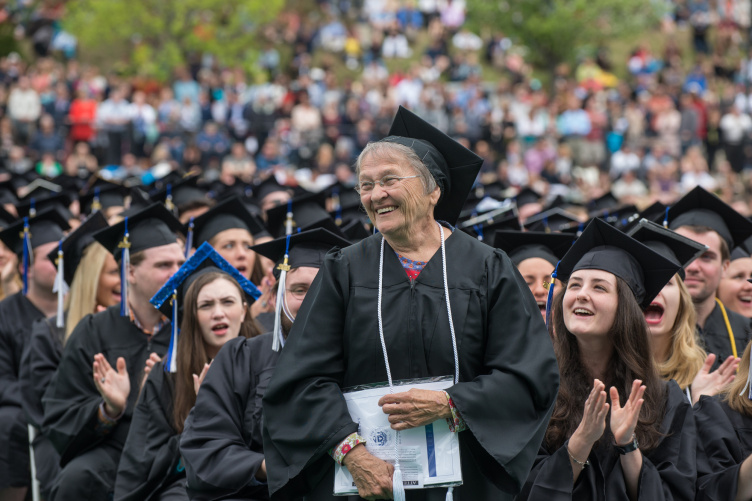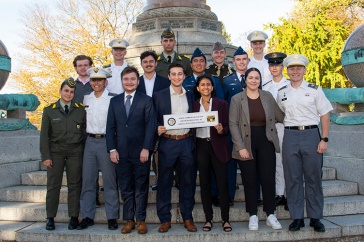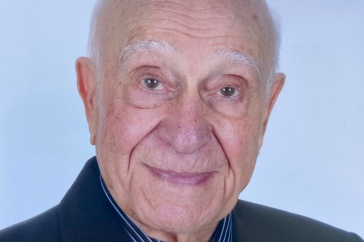
Verna Boudreau, 79, stands up as President Mark Huddleston recognizes her as among the class of 2015's stand-outs during Commencement. Boudreau also won the Malcolm and Virginia Smith Prize, which is awarded annually to a graduating senior in each department in the College of Liberal Arts who has demonstrated the most progress and growth academically in their major field of study during their undergraduate years.
In the weeks leading up to her UNH graduation, Verna Boudreau, just like her fellow members of the class of 2015, was wading through a flurry of Commencement-related emails — where to pick up caps and gowns, where to line up, what time to be in which location on the big day.
But unlike any of her classmates, Boudreau had reason to feel a bit of extra pride. At 79 years of age, she was the oldest member of the class of 2015 to earn her bachelor's degree.
It's a title she bears happily, evidenced by the broad smile on her face as she marched onto Memorial Field, surrounded by a sea of mostly 20-somethings, and reflected on her accomplishment.
"Earning my degree feels fantastic. When I told my daughters I wanted to do this, they all said, 'Go for it!' They were so supportive. I just enjoy learning. It's as simple as that: I have always loved school," she says.
She earned her associate's degree here in 2007, and since then has been working toward her bachelor's degree in English. Boudreau took advantage of the tuition waiver that allows New Hampshire residents 65 years or older to take up to two credit courses per academic year free of tuition.
The fact that Boudreau completed her undergraduate degree at the age of 79 is impressive — but also a bit puzzling. After a full career in special education and raising a family, what would drive someone who should be enjoying retirement and grandchildren to decide that finals, papers and study groups would be more fun?
It's something she'd been wanting to do for a long time, and it traces back to when she was a teenager in Malden, Massachusetts.
When she was in high school, Boudreau's parents were at odds about whether she should go to college, she explains. "My mother said, 'Absolutely not,' but my father was all for it; he loved school." "My mother said, 'Absolutely not,' but my father was all for it; he loved school."
Despite her parents' feelings, it was Boudreau's decision.
"I decided not to go after high school. And you know, it was a dumb decision," she says.
Instead she got married at the age of 21, and had three daughters — Renee, Beth '84 and Karen '86. But Boudreau's father's encouragement never left her.
"I guess it was because of Dad wanting me to go to college that I began to think of it later in life. That, and the free program; the opportunity was there for me at my age, and I always liked to learn, always liked school — still do," she says.
Being an adult learner, or non-trad, as those beyond the 18-21-year-old set call themselves, can have its challenges. Short-term memory isn't as reliable as it was in your teens and 20s, for example. And group projects were a little difficult, because the thoughts don't come as fast, says Boudreau, and you tend to stay a little bit quiet. But most of the time, she says, it was great fun becoming friends with her classmates, studying and learning together.
And it's lead to more than a few funny moments in class, too.
"The gray hair... the glasses... and usually older people sit up front. Sometimes when young students come in to the first class of the semester, they think I'm the professor!" Boudreau says with a laugh.
Her longtime advisor, professor David Watters, was impressed with Boudreau's work ethic since she first took his English 515 class in 2008.
"Whenever we have older students we can rely on them to have a real life perspective and be particularly focused. They're coming back with a certain kind of dedication," says Watters. "Verna has an insatiable curiosity and delight in learning. For her to be able to come back and really fulfill that dream of getting a college degree is something that's so palpable about her."
Boudreau says she enjoys being around the energy of younger students, especially seeing how they change from year to year, and answering the annual question from them, "How come you're taking classes?"
"Watching them mature and change is a fun part of the journey. That's what I call it, 'my journey,'" she says.
"We always talk about how education is a transformation, that it opens up people not only to the world of learning, but also to parts of themselves, we talk about that for those undergraduates who are 19 or 20 years old. Here's Verna well into her 70s, really discovering things about herself, that she likes to write. Her development as a writer is quite interesting, she's found considerable success in her autobiographical writing," says Watters.
She also enjoyed the history angle of some of her English classes, and created an independent study with Watters to research Dover's burying grounds and literary references to Colonial-era Seacoast families.
Boudreau's effect on the classroom can't be underestimated, says Watters. Believing she was a pioneer of her generation because she embarked on a career when many women were not entering the workforce, and now in UNH classrooms, she's setting a new example for younger students.
"I've been fascinated to watch the friendships she formed with the 18- and 19-year-olds in her classes," Watters says. "That suggests to me that her presence in unspoken ways was a real inspiration and a real role model, particularly to the young women in my classes. There was a real appreciation for the presence of someone like Verna ... who maybe now is something of a foremother for the students to see, and it's inspiring to see that she still cares passionately about things."
-
Written By:
Michelle Morrissey ’97 | UNH Magazine | michelle.morrissey@unh.edu




















































